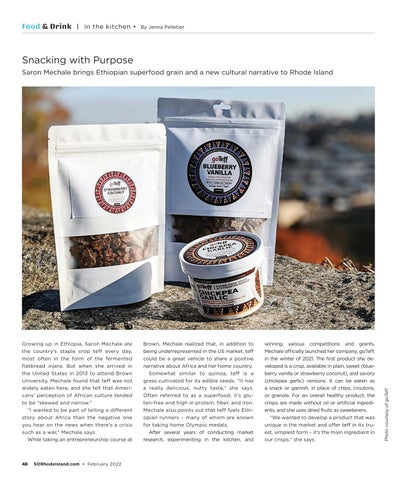Food & Drink | in the kitchen •
By Jenna Pelletier
Snacking with Purpose
Growing up in Ethiopia, Saron Mechale ate the country’s staple crop teff every day, most often in the form of the fermented flatbread injera. But when she arrived in the United States in 2013 to attend Brown University, Mechale found that teff was not widely eaten here, and she felt that Americans’ perception of African culture tended to be “skewed and narrow.” “I wanted to be part of telling a different story about Africa than the negative one you hear on the news when there’s a crisis such as a war,” Mechale says. While taking an entrepreneurship course at
48
SORhodeIsland.com • February 2022
Brown, Mechale realized that, in addition to being underrepresented in the US market, teff could be a great vehicle to share a positive narrative about Africa and her home country. Somewhat similar to quinoa, teff is a grass cultivated for its edible seeds. “It has a really delicious, nutty taste,” she says. Often referred to as a superfood, it’s gluten-free and high in protein, fiber, and iron. Mechale also points out that teff fuels Ethiopian runners – many of whom are known for taking home Olympic medals. After several years of conducting market research, experimenting in the kitchen, and
winning various competitions and grants, Mechale officially launched her company, goTeff, in the winter of 2021. The first product she developed is a crisp, available in plain, sweet (blueberry vanilla or strawberry coconut), and savory (chickpea garlic) versions. It can be eaten as a snack or garnish, in place of chips, croutons, or granola. For an overall healthy product, the crisps are made without oil or artificial ingredients, and she uses dried fruits as sweeteners. “We wanted to develop a product that was unique in the market and offer teff in its truest, simplest form – it’s the main ingredient in our crisps,” she says.
Photo courtesy of goTeff
Saron Mechale brings Ethiopian superfood grain and a new cultural narrative to Rhode Island











